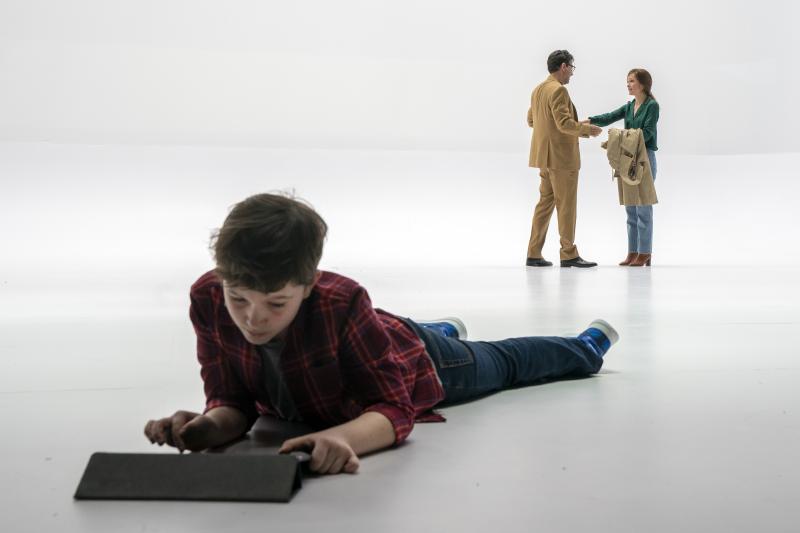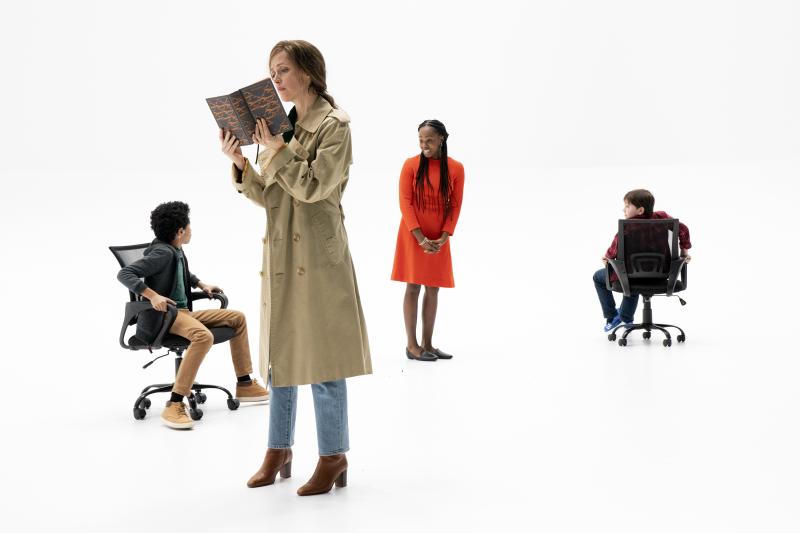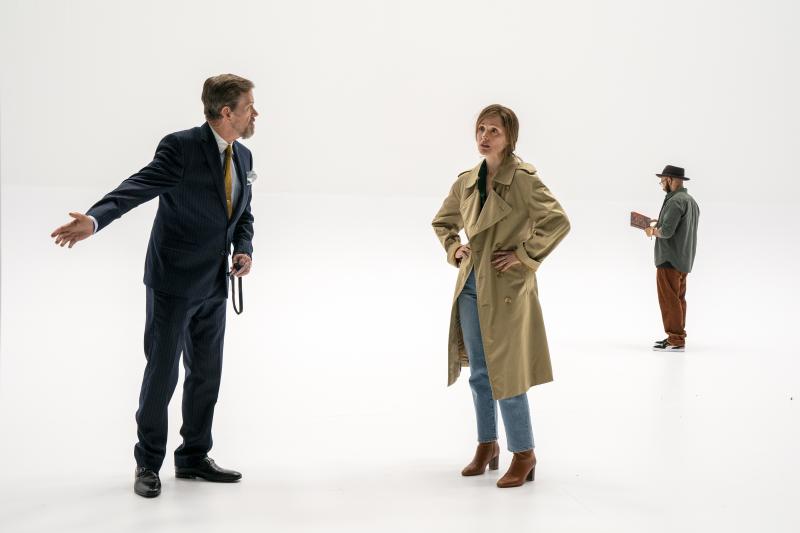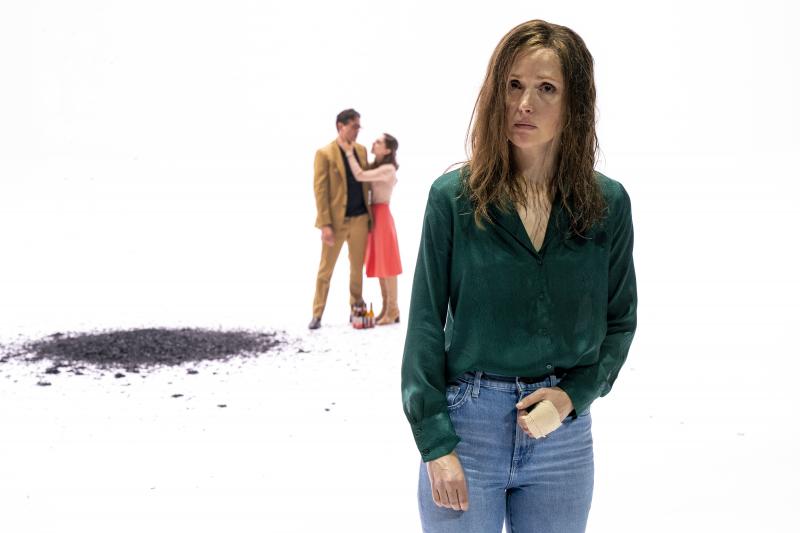Review: MEDEA for Modern Times Seeks to Shed Light on Dark Acts at Harvey Theater at BAM Strong
It appears on the news on an almost daily basis, we see it in films and read about it in books -- someone suddenly snapped and committed a heinous, unthinkable crime, robbing another person or people of their time on this earth before it was meant to be spent. When one hears about senseless horrors such as mass shootings, the Manson murders, suicide bombers or acts of rage and terror driven by crimes of the heart, it is easy to label those who perpetrated such terrible violence against fellow human beings as evil, monsters and at the very least -- completely insane. How else to justify that which defies any rational explanation and is unfathomable to most? But what causes a person to be driven to that edge, the absolute point of no return?
The astounding, unnerving and utterly transfixing new production of Medea, set in present times and starring the real-life couple with a pair of boys of their own -- Bobby Cannavale and Rose Byrne -- written and directed by Simon Stone, now playing at Harvey Theater at BAM Strong on an extended run through March 8th, seeks not to answer that question but leaves the audience pondering it and works backward to attempt to shed light on the process that could lead to such inconceivable atrocities. With Broadway in its sleepy season before the spring debuts and end-of-season Tony-bait productions, serious theatre-goers have a better bet visiting Brooklyn to see one of the most compelling theatre pieces early into the year. Those expecting classic Greek tragedy or the chance to see Rose Byrne take on an iconic, if infamous, female role akin to the men of a certain age stepping into King Lear again and again, might be disappointed to find, instead, a stark and realistic portrayal of a broken family with a ghastly punctuation mark destined to complete their tale. But the piece (while inspired by the Euripides version of the story) stands on its own as a powerful piece of drama that holds a very disturbing mirror to society, modern or ancient, eternally ruthless when pushed to the brink when all is lost with nothing left to lose. The titular character and tale form a loose framework for a contemporary nightmare and the circumstances that caused a devoted mother and wife, Anna (Rose Byrne), to form a bloodlust against not only those she despises but those she adores -- or so it would seem.

Photo Credit: Richard Termine
In the opening scene, Anna and Lucas (Bobby Cannavale) are reconnecting after some time apart due to various incidents that are hinted at, leading one to understand that she had spent time away, institutionalized for grave wrongdoings against her husband that both are trying to dance around and possibly move past. She is clearly holding herself together with a thread, ready to break apart at any moment, yet desperately trying not to do so. Their conversation was terse and awkward, showing none of the ease of someone you'd made a vow to spend a lifetime and had two children with, but fear from both sides, as if each were approaching a dog who had bitten them. The subtleties captured in Byrne's expressive eyes were remarkable, particularly because they were actually captured on camera, blown up and projected above the live actors standing across from each other with ample distance between them as if in a spaghetti western shootout scene. In this way, Medea was very cinematic, befitting the actors equally confident on stage and screen. Byrne, a true beauty, was exposed within an inch of her life, every pore, every line magnified in hi-def, rendering her raw, exposed and vulnerable from the very beginning.
There was humor in the dialogue and presentation, which is part of the releasing of nerves and anxiety that laughter provides. Anna's attempts at normalcy and calm with self-deprecation and pseudo-spiritual self-help jargon only acted as a bandaid to deeper wounds that are revealed through her "crazy eyes" when triggered about what caused this mess in the first place -- Lucas' infidelity with another, younger woman that drove Anna to poison her husband through his food as punishment, until she was caught and her life as she knew it was destroyed. We may joke about people's erratic actions or behaviors until it is no laughing matter. Thus the stage was set from the first scene with secrets and lies unveiling themselves as the play pushed forward.
Anna returned home after her time in a mental institution to endeavor toward a fresh start and see her two sons Edgar and Gus (played by Gabriel Amoroso and Emeka Guindo, alternated with Orson Hong and Jolly Swag) along with the husband she tried to slowly kill. Meanwhile, Lucas has gained sole custody and is living with the woman he cheated on her with (Clara, played smartly by Madeline Weinstein), the daughter of Lucas and Anna's boss at a well-funded pharmaceuticals research lab, Christopher (the marvelous Dylan Baker, dripping with corporate sliminess and agenda) -- who refuses to allow her to return, despite her years of achievements and contributions. Anna's compassionate social worker Elsbeth (Jordan Boatman) and the sincere, humble manager of her new job placement at a bookstore, Herbert (Victor Almanzar), both serve as more annoyance than assistance to her, despite their well-intended efforts. It was not a friendly welcome wagon home and it's the thousand tiny cuts that rip any ounce of Anna's composure -- facade or not -- to shreds the way pulling at a single string can unravel an entire sweater.

Photo Credit: Richard Termine
What makes Medea work is that Byrne manages to make Anna likable and even somehow relatable, not a character of mythic proportions or a crafty witch as in various incarnations of the archaic story, but a wronged woman whose man abandoned her, discarded her and took everything away after she'd given all of herself, her resources and her life to building his dreams (which he himself took the credit for), create a home and family environment which she thought was what he wanted. However, it became evident that all she did and sacrificed only caused him to resent and reject her, give up on their connection, right down to carnal urges, which led her to begrudge him and all she's helped him build and create, right down to their own children. Despite many factors she's got against her, Byrne makes the audience feel sympathy, compassion and a sense of understanding for Anna's plight -- until it goes too far or course -- but we are with her on the journey and can see the injustices she was dealt time and again.
Bobby Cannavale does his best to keep up with the strong women and that is part of his role and appeal. His attempts to be equally accommodating and compassionate to his soon-to-be ex-wife and the mother of his children and his young live-in mistress and soon-to-be new wife are both sincere and utterly disturbing. As a woman, it is revolting to see him from a fly-on-the-wall perspective lie flagrantly to both women, pit them against each other and still come out acting like the victim. Cannavale's performance contains moments of overt overacting fresh from the school of Al Pacino & Robert De Niro (whose careers never faltered despite the melodrama) but in moments of more subtlety, he portrays the same mix of empathy and caring alternatively paired with lust, swagger and self-preservation above all cost that made him such a dynamic, relentless, yet complex and compelling force in Blue Jasmine.
The strong verbal, visual, artistic and directorial choices and sound design are loaded with intensity and intention to support the dialogue and performances. Often, in real life, when two people are having a conversation, it is actually more like a three-person scene that includes the one who is being talked about but not present. In the most heated and dynamic scenes between two people, the person who was the subject of interest remained in the scene saying nothing as a ghost or so-called "elephant in the room". It is an interesting way to visually expose on our hypocrisies and inner dealings with regards to a person not there to defend themselves or admit their guilt. Outside of the dialogue, the sound design (by Stephan Gregory) is mostly silent except for when a low, foreboding hum is a dead giveaway that something amiss is brewing. The set design by Bob Cousins was stark and clinical yet riveting -- it felt more like a Chelsea art gallery district installation than a play but that served as part of the appeal. It also evoked the glaring fluorescent lights white walls of a hospital (mental or medical). Props were sparse but potent and foretelling of what was to come. The quarantined sterility of it all with the casual disregard of the underlying issues reeked of privilege and that is what we are meant to feel from these characters. They are driven by their own desires and blind to the realities unfolding around them and the consequences their actions will have on others.

Photo Credit: Richard Termine
The concern and process of how to make a piece of dramatic literature or themes come to vibrant life and be relevant to modern times is an issue that comes up every time a classic is revived or an ancient tale is retold in a contemporary way. Some elements will feel stale and dated, while others remain shockingly pertinent, despite the era from which they were born because they are a part of the human condition that no amount of evolution has been able to fully shake off -- the all-too-relatable feelings of jealousy, betrayal, pettiness, possessiveness, deception, ambition, rage and vengeance. Thousands of years ago when Medea was first conceived and explored, mental health and therapy weren't even concepts.
The character of Medea in the Euripides text was a witch, and a powerful one, who assisted her husband Jason in defeating his enemies through her magical powers and prowess only to be abandoned by him and replaced. These days, though some stigmas remain; the discussion of mental health is so ubiquitous that entire magazines and sections of bookstores are devoted to the topics, as well as many viable career paths from psychiatrist to analyst to social worker to life coach who all explore this sometimes rocky terrain of the mind and emotions. Yet somehow, as far as we have come, the underlying issues remain the same. And if we could see it coming, why didn't we stop it? Citing mental health (or lack thereof) as the problem and place for blame is very trendy now. Even the current president tries to dismiss some of the most ghastly crimes (especially those involving gun violence) as the result of a troubled mind, not bothering to go deeper and retrace the steps that may have led to those disturbances or seek to discover what could have been done, individually and systematically, to prevent them. I consulted Laura McLaughlin, a therapist specializing in trauma and patterns in which destructive behaviors emerge, about what causes a person to snap and commit the unthinkable. "Early childhood trauma for sure," she explained, "perceived major rejection, shame, one bad hand dealt after the next -- so mostly chronic things. Breaks don't happen instantly."

Photo Credit: Richard Termine
Many of the key topics in Simon Stone's Medea are also explored in some of the most successful and lauded films of the past year, all nominees and winners of major categories at the 92nd Academy Awards: Marriage Story, The Joker and Parasite. (I saw the play on the day of the Oscars, and if you've not seen these films, especially Parasite, stop reading this review and do so now). It is, in many ways, a combination of the three morphed into one -- with the focus on a female antagonist-protagonist -- in the way that marriage, family, mental health, trauma, rejection, isolation and what leads a person to snap are investigated. This makes Medea very current and of the zeitgeist. But these stories, shocking and sad as they are, are not new. Some infamous examples of an otherwise normal and healthy, even highly-intelligent women committing extreme and irrational acts triggered by men they were linked to: NASA astronaut Lisa Nowak, who drove nearly a thousand miles to kidnap the woman who was the current flame of a fellow astronaut she'd been involved with; Lorena Bobbitt, who cut off her husband John's penis under the defense of living in fear of him and his unwelcome sexual advances (she was found not guilty due to the cause of "insanity"); and Deborah Green, a physician who committed a similar act as Anna from Stone's Medea in Kansas City in 1995 and served as a case study for the play. However, it seems to be reaching a boiling point now and society's interest in uncovering why instead of turning a blind eye and dismissing such desperate and despicable acts under the umbrella of general ''insanity'' is growing, hence being the focal points of some of the most talked-about recent works of stage and screen.
Dismissal as merely evil or insane is not enough, and Simon Stone's Medea leaves the question of "Why?" lingering in the air like the ashes that fell from the charred home which housed the corpses of everyone Bobby Cannavale's character Lucas ever cared about while he pondered how that could have possibly happened in the final moments of the play. It's shocking and may come off as a bit on-trend but at least we are seeing and talking about it.
Medea is now playing on an extended run through March 8, 2020. For tickets and more information, visit: www.bam.org
Add Your Comment
Videos
